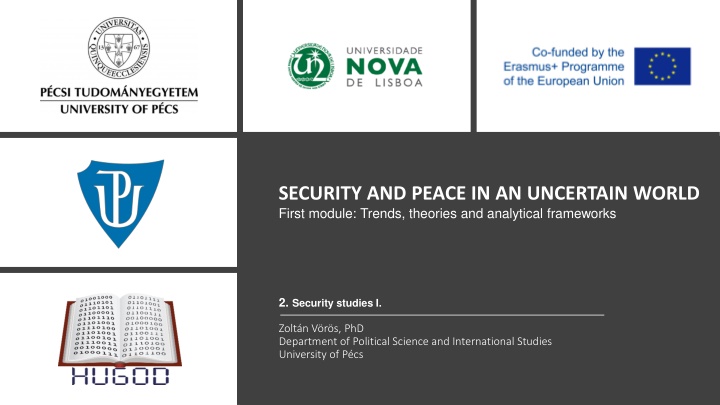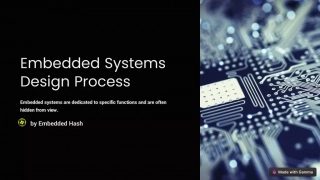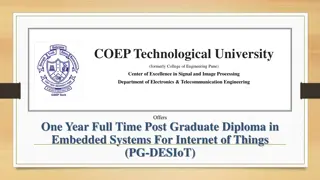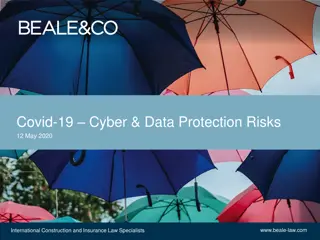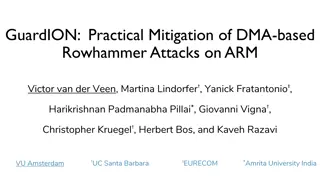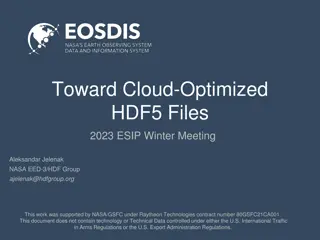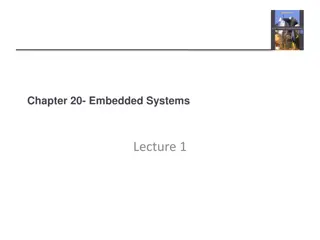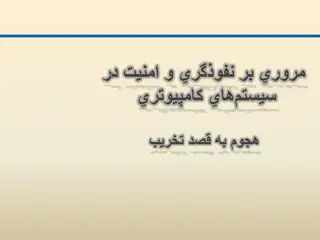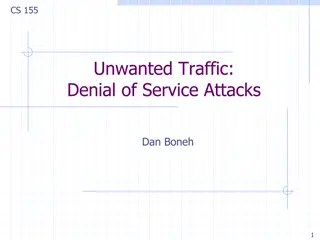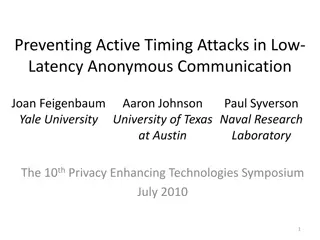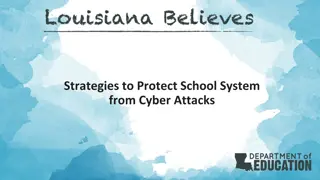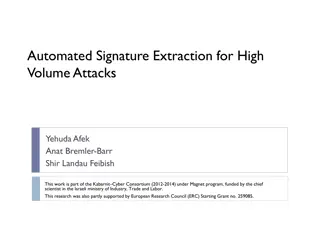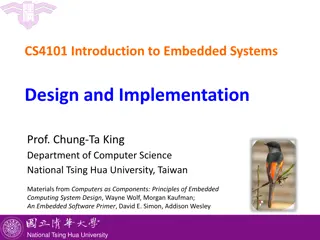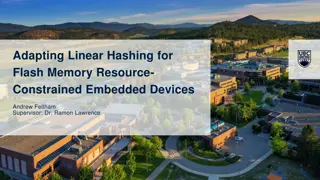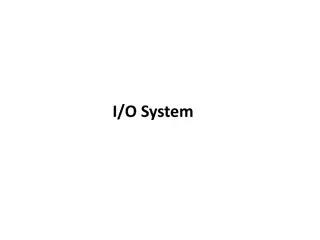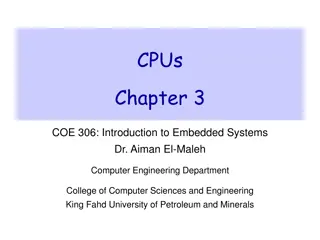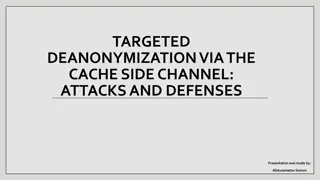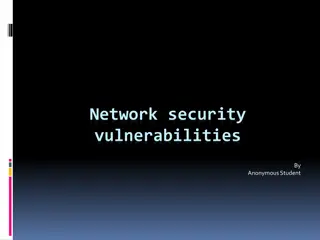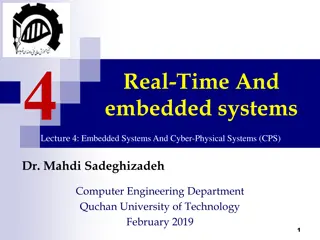Optimized Power Analysis Attacks on Embedded Devices
Antonella Cioffi, a PhD student in Information Technology and Electrical Engineering, discusses her research on optimized power analysis attacks against embedded devices. Working with Prof. Pasquale Arpaia and Francesco Bonavolont, she explores security vulnerabilities in IoT devices and presents findings from experiments and analysis. The study aims to enhance reproducibility and assess vulnerabilities for improved cybersecurity measures. Antonella's background in Electronic Engineering and collaborations with ST Microelectronics highlight her expertise in the field.
Download Presentation

Please find below an Image/Link to download the presentation.
The content on the website is provided AS IS for your information and personal use only. It may not be sold, licensed, or shared on other websites without obtaining consent from the author.If you encounter any issues during the download, it is possible that the publisher has removed the file from their server.
You are allowed to download the files provided on this website for personal or commercial use, subject to the condition that they are used lawfully. All files are the property of their respective owners.
The content on the website is provided AS IS for your information and personal use only. It may not be sold, licensed, or shared on other websites without obtaining consent from the author.
E N D
Presentation Transcript
SECURITY AND PEACE IN AN UNCERTAIN WORLD First module: Trends, theories and analytical frameworks 2. Security studies I. Zolt n V r s, PhD Department of Political Science and International Studies University of P cs
The following disclaimer shall be added to the inner pages of the publications and studies written by external independent bodies with support from the European Commission: , , , . BG Podpora Evropsk komise p i tvorb t to publikace nep edstavuje souhlas s obsahem, kter odr pouze n zory autor , a Komise nem e b t zodpov dn za jak koliv vyu it informac obsa en ch v t to publikaci. CS Europa-Kommissionens st tte til produktionen af denne publikation udg r ikke en godkendelse af indholdet, som kun afspejler forfatternes egne synspunkter, og Kommissionen kan ikke holdes ansvarlig for den brug, der m tte blive gjort af de deri indeholdte oplysninger. DA Die Unterst tzung der Europ ischen Kommission f r die Erstellung dieser Ver ffentlichung stellt keine Billigung des Inhalts dar, welcher nur die Ansichten der Verfasser wiedergibt, und die Kommission kann nicht f r eine etwaige Verwendung der darin enthaltenen Informationen haftbar gemacht werden. DE , , . EL The European Commission's support for the production of this publication does not constitute an endorsement of the contents, which reflect the views only of the authors, and the Commission cannot be held responsible for any use which may be made of the information contained therein. EN El apoyo de la Comisi n Europea para la producci n de esta publicaci n no constituye una aprobaci n del contenido, el cual refleja nicamente las opiniones de los autores, y la Comisi n no se hace responsable del uso que pueda hacerse de la informaci n contenida en la misma. ES Euroopa Komisjoni toetus k esoleva v ljaande koostamisele ei t henda v ljaandes esitatud sisu kinnitamist. V ljaandes esitatud sisu peegeldab vaid autorite seisukohti. Euroopa Komisjon ei vastuta selles sisalduva teabe kasutamise eest. ET Euroopan komission tuki t m n julkaisun tuottamiseen ei tarkoita sit , ett sis lt , joka kuvastaa pelk st n tekij iden n kemyksi , saa kannatusta, eik komissiota voida saattaa vastuuseen niiden sis lt mien tietojen mahdollisesta k yt st . FI Le soutien de la Commission europ enne la production de cette publication ne constitue pas une approbation du contenu, qui refl te uniquement le point de vue des auteurs, et la Commission ne peut pas tre tenue responsable de toute utilisation qui pourrait tre faite des informations qu elle contient. FR N hionann taca ocht an Choimisi in Eorpaigh do th irgeadh an fhoilseach in seo agus formhuini ar bhair an fhoilseach in, lena l ir tear tuairim na n- dar amh in, agus n f idir freagracht a chur ar an gCoimisi n bhfaisn is at ann. GA as aon s id a d fh adfa a bhaint as an HR Potpora Europske komisije proizvodnji ove publikacije ne predstavlja potporu sadr aju koji odra ava samo stavove autora i Komisija ne mo e biti odgovorna za uporabu sadr anih informacija.
Az Eurpai Bizottsg tmogatsa ezen kiadvny elksztshez nem jelenti a tartalom jvhagyst, amely kizrlag a szerzk ll spontj t t kr zi, valamint a Bizotts g nem tehet felel ss ezen inform ci k b rminem felhaszn l s rt. HU Il sostegno della Commissione europea alla produzione di questa pubblicazione non costituisce un'approvazione del contenuto, che riflette esclusivamente il punto di vista degli autori, e la Commissione non pu essere ritenuta responsabile per l'uso che pu essere fatto delle informazioni ivi contenute. IT Europos Komisijos parama io leidinio rengimui nerei kia pritarimo jo turiniui, kuriame pateikiama autori nuomon , tod l Europos Komisija negali b ti laikoma atsakinga u informacij panaudot iame leidinyje. LT Eiropas Komisijas atbalsts s publik cijas sagatavo anai nav uzskat ms par satura apstiprin jumu, kas atspogu o tikai autoru viedok us, un Komisija nevar b t atbild ga par taj ietvert s inform cijas jebk du izmanto anu. LV L-appo tal-Kummissjoni Ewropea g all-produzzjoni ta din il-pubblikazzjoni ma jikkostitwixxix approvazzjoni tal-kontenut, li jirrifletti biss il-fehmiet tal-awturi, u l-Kummissjoni ma tistax tin amm responsabbli g al kwalunkwe u u li jista jsir mill- informazzjoni li tinsab fiha. MT De steun van de Europese Commissie voor de productie van deze publicatie houdt geen goedkeuring van de inhoud in. De inhoud geeft de standpunten van de auteurs weer en de Commissie kan niet aansprakelijk worden gesteld voor het gebruik dat eventueel wordt gemaakt van de daarin opgenomen informatie. NL PL Wsparcie Komisji Europejskiej dla produkcji tej publikacji nie stanowi poparcia dla tre ci, kt re odzwierciedlaj jedynie pogl dy autor w, a Komisja nie mo e zosta pociagni ta do odpowiedzialno ci za jakiekolwiek wykorzystanie informacji w niej zawartych. O apoio da Comiss o Europeia produ o desta publica o n o constitui um aval do seu conte do, que reflete unicamente o ponto de vista dos autores, e a Comiss o n o pode ser considerada respons vel por eventuais utiliza es que possam ser feitas com as informa es nela contidas. PT RO Sprijinul acordat de Comisia European pentru elaborarea acestei publica ii nu constituie o aprobare a con inutului, care reflect doar opiniile autorilor, iar Comisia nu poate fi tras la r spundere pentru orice utilizare a informa iilor con inute n aceasta. Podpora Eur pskej komisie na v robu tejto publik cie nepredstavuje s hlas s obsahom, ktor odr a len n zory autorov, a Komisia nem e by zodpovedn za pr padn pou itie inform ci , ktor s v nej obsiahnut . SK Podpora Evropske komisije za pripravo te publikacije ne pomeni potrditve vsebine, ki izra a le mnenja avtorjev, in Komisija ne more biti odgovorna za kakr no koli uporabo informacij, ki jih vsebuje. SL Europeiska Kommissionens st d t framst llningen av detta dokument utg r inte ett godk nnande av dess inneh ll, vilket endast terspeglar upphovsm nnens sikter, och Kommissionen kan inte h llas ansvarigt f r n gon anv ndning av informationen i det. SV
Introduction Security is everywhere around us An always important topic. But what is security? Essentially contested concept? Security undoubtedly means different things to different people. Involves the alleviation of threats to cherished values. Security is unaviodably political term. And security studies can never be only intellectual, hyptothetical, since because it is stimulated by achieving security for real people in real places! Interpreting past, understanding present, influencing future Security is a trump-card in several cases! Who gets to decide what security means?
What is Security? How this field evolved? Great power politics Technology Key events Internal dynamics of academic debates Institutionalization So: material power, knowledge, history, social constructions and wealth, organizational dynamics.
What is Security? Golden Age : 1950s, 1960s Academic concepts outside governments The four S s of Security Studies Focused on states: they were considered to be both the most important agents and referents of security in international politics. Was about strategy: intellectual and practical concerns about the ways to handle threat (and use military force) It aspired to be scientific: searching authentic, objective knowledge Preserving status quo: Avoiding radical and revolutionary changes Barry Buzan in 1983 Security is not only for states it is related to all human collectivities Questioning the use of military force
What is Security? Four fundemental questions about Security Studies What is security? Whose security are we talking about? What counts as a security issue? How can security be achieved?
What is Security? The alleviation of threats to cherished values. Especially those, which threaten the survival of a particular referent object in the future. Defense is a post factum action. Happens after the attack occured. There are two different philosophical understandings of security. First: Security is virtually synonymus with the accumulation of power. So, the more power actors can accumulate (money, weapons, army, territory, etc.), the more secure they will be. Second: Security is based on cooperation. Security is understood as a relationship between different actors rather than a commodity. (Of course the relation can be positive and negative as well) Discussion: Nuclear WMD in Iran
Approaches to Security De facto approach A situation without threat The activation of danger is not expected Sense, perception Sense of security of the society Can be manipulated over and underestimating, exaggerating risk (on purpose) If a group feels threatened: reaction is needed from politics Institutional, legal approach System of guarantees (secret service, infrastructure, planning, international organizations) helping security.
Widening Scope The concept is meaningless without something or somebody to secure. People or state? 1. For long decades the answer was: the state The period of state security 2. But if the people are the subject of security studies, then Which humans to prioritize? 3. Third approach: Society 4. Fourth: All levels of social groups, from independent human to international system 5. Fifth: Planet Earth
Traditional Subjects So, according to a popular and accepted view, the subject of the security: The sovereignty of the state The life of citizens National interests and property If any of this is in danger, the country is in danger. Discussion: The life of citizens Tools and policies of a state
Complexity Security is more complex than ever. At the early stages, there were two security threats: Enemy Natural disaster. Today: Interdependence, system-like threats. The threats are connected
Sectoral Approach The sectoral theory of security was introduced by Barry Buzan, a member of the Copenhagen School, and his co-authors in their 1983 work "People, States and Fear: The National Security Problem in International Relations". Military sector: the building and maintaining of a military offensive and defensive force against both internal and external armed threats. The main objective of the state is to protect its territory (land, water, airspace) and its population. states dissatisfied with the status quo terrorist organisations organised criminal groups
Sectoral Approach Economic: Determined by the state's access to raw materials and energy, its debt situation, the spill-over of international recessions, the development of the state's fiscal, growth and inflation indicators. economic crises (local, regional, global) energy dependence economic sanctions (boycotts, embargoes) Political: The object of protection is primarily the sovereignty of the state, and therefore the concept of political security refers to the internal stability of the country, the functioning of its institutions and the ability of the state to carry out its functions without disruption, on the one hand, and its consolidated external relations and international position free from threats, on the other. influence of other state(s) extremist political forces lack of a minimum internal political consensus inability of basic state institutions to function
Sectoral Approach Social: Language, culture means the sustainability of national traditions, values, religious- national identity, peaceful coexistence and social peace between nations, nationalities, ethnic groups, religious denominations living in the country. Migration national, ethnic, religious hostilities extreme social disparities Environmental: Determined by a country's geography, geography, climate, earthquake hazards, human behaviour that threatens the environment. Floods, tsunamis Earthquakes volcanic eruptions climate change water scarcity
Further Sectors Human Security: Closely related to the concept of social security, the subject of security is no longer the state but the person, the individual. The concept was laid down in the 1994 UNDP Human Development Report. It means the protection of the individual (life, physical integrity, human dignity) and the guarantee of the basic conditions for a decent environment and quality of life. epidemics hunger water scarcity environmental pollution unemployment drugs crime, mass understanding of freedoms
Further Sectors Cybersecurity: the set of tools, policies, security concepts and activities aimed at protecting the computing environment, the assets and systems of the organisations and users that use it. cyber warfare, state-sponsored cyber attacks cybercrime (hacker attacks, e.g. against individuals' social profiles, email accounts) proliferation of cyber weapons
Scales Danger, risk - ALWAYS THERE! It is always there, existing (Environmental, natural, etc.) A situation a state have to be ready for, if it escaletes. Can prevent, control. Risk in this: failure in handling the situation. The political level is the one to decide: using force or diplomatic tools. Crisis Activation of danger, still reversible. Outcome is not clear: escalation or solution. Threat Clear, articulated will from a group/state/person to solve issues by using force. Conflict Clash.
Bibliography Storey, David: Territory: The Claiming of Space. Routledge, London, 2011. [2nd ed.] ISBN: 9780415575508 Williams, P.D. and MacDonald, M. (2018) An introduction to security studies . In Security Studies: An introduction, pp. 1-14. Human Development Report, 1994 https://hdr.undp.org/content/human-development-report-1994
Thank you for your attention!
